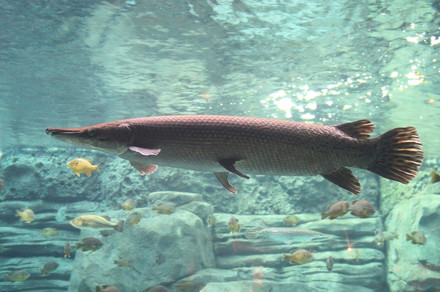Why it matters to you
Accidentally stabbing your hand might not result in injury if you’re wearing gloves made from this protective material.
In a bid to build flexible and durable protective gear, researchers from McGill University turned to nature for inspiration and frequented a fish market to find test subjects.
Scientists often adopt structures found in nature for new functions. Artificial neural networks — an approach that has enabled great advances in AI — is modeled off of the human brain and nervous system. Harvard roboticists, for example, have built tiny drones that can perch like insects in order to conserve energy. Work smarter, not harder is a tenet of bio-inspired design.
“The fish scales we see on fish nowadays are the result of millions of years of trial and error through natural evolution,” Francois Barthelat, lead researcher at McGill’s Laboratory for Advanced Materials and Bioinspiration, told Digital Trends. “After all that time of fine tuning, we should expect that scales must be very good at what they are made for, in this case resisting bites from predators.”
But not all scales evolve equally. After carrying dozens of striped bass back to the lab, sliding their scales under a microscope, and fracturing them to study their physical properties, Barthelat and his team realized they were probing the wrong species. So, they released the bass and caught a hardy alligator gar.
More: Engineers create bio-inspired, silk-based materials with programmable traits
“The alligator gar is a particularly good model because its scales are very bony and extremely hard, much harder than the scales on your regular fish market fish,” Barthelat said. “Alligator gars are so well ‘armored’ that they are virtually impossible to cut, even with a hacksaw.”
The studies affirmed Barthelat’s assumption about the strength of scales — in fact, it showed scales to be the toughest collagen-based material known — but it also revealed the often counter-intuitive aspects of natural design, such as that smaller scales are less penetrable than larger ones.
Aided by a computer model, Barthelat and his team used their newfound knowledge about the optimal size, shape, and arrangement of scales to develop highly protective, ceramic-covered gloves. Future applications may help protect areas like the neck, knees, and elbows.
“Our bio-inspired scale design excels in applications where a balance between flexibility and protection is required,” Barthelat said. “We are now focusing on personal protection in hazardous industrial environments, and we have also started to explore applications in sports equipment.”
A paper detailing the research was published in the journal Bioinspiration & Biomimetics,

